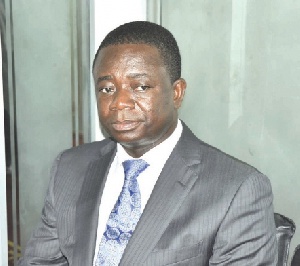- Home - News
- TWI News | TV
- Polls
- Year In Review
- News Archive
- Crime & Punishment
- Politics
- Regional
- Editorial
- Health
- Ghanaians Abroad
- Tabloid
- Africa
- Religion
- Election 2020
- Coronavirus
- News Videos | TV
- Photo Archives
- News Headlines
- Press Release
Business News of Sunday, 13 September 2015
Source: kasapafmonline.com
Distribution of cocoa inputs transparent – COCOBOD
The Ghana Cocoa Board (COCOBOD) has insisted that the free supply of inputs to cocoa farmers is transparent.
The intelligence operative of the Board who spoke on behalf of Dr. Stephen Opuni, the Chief Executive Officer (CEO) of the COCOBOD made the assertion at a press briefing organized by the Ashanti Regional Office of the Cocoa Health and Extension Division (CHED), at Tepa in the Ahafo-Ano North District of Ashanti Region.
The event was held to clarify allegation by Nana James Kwabena Dankwa, chief farmer at Numasua (aka Camp Two), a cocoa-growing community in the Tepa Cocoa District, in a news item, aired on Radio Gold FM on Monday, August 31, alleging that “farmers from Tepa, Nyinahini and Obuasi have been deprived of the mass cocoa spraying exercise and distribution of some farm inputs”.
Nana Dankwa further alleged that the distribution was done on partisan basis.
The operative said the process of carting, delivery and distribution of inputs like fertilizers, fungicides and pesticides and spraying machines by the COCOBOD as incentive packages to the farmers in the cocoa industry for increased yields.
He noted that when Dr. Opuni took office, he made security of the cocoa industry his main concern, due to numerous complaints he received from farmers about misdeeds in relation to the distribution of the inputs to them (farmers).
The operative who played an active role in the recent arrest of two police personnel and their accomplices at the Achirensua barrier in the Asutifi South District, concerning the diversion of 350 bags of fertilizers from Sankore in the Asunafo South District to Kumasi, stressed that there was strict but transparent system in place for the distribution of the inputs.
“Due to the strengthened security operations under Dr. Opuni’s administration, inputs from the warehouse in Tema were monitored into the region, through the district, and finally to the farm gate for the benefit of farmers”, he noted.











